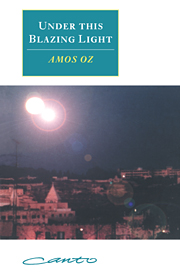Book contents
- Frontmatter
- Contents
- Translator's note
- Preface to the Hebrew edition
- Introduction
- Events and books
- Under this blazing light
- ‘Man is the sum total of all the sin and fire pent up in his bones’
- ‘A ridiculous miracle hanging over our heads’
- The State as reprisal
- A modest attempt to set out a theory
- The meaning of homeland
- The discreet charm of Zionism
- A.D. Gordon today
- Thoughts on the kibbutz
- The kibbutz at the present time
- How to be a socialist
- Munia Mandel's secret language
- Pinchas Lavon
- The lost garden
- An autobiographical note
- An alien city
- Like a gangster on the night of the long knives, but somewhat in a dream
- Notes
- Publication history
- Index of names
An autobiographical note
Published online by Cambridge University Press: 07 September 2010
- Frontmatter
- Contents
- Translator's note
- Preface to the Hebrew edition
- Introduction
- Events and books
- Under this blazing light
- ‘Man is the sum total of all the sin and fire pent up in his bones’
- ‘A ridiculous miracle hanging over our heads’
- The State as reprisal
- A modest attempt to set out a theory
- The meaning of homeland
- The discreet charm of Zionism
- A.D. Gordon today
- Thoughts on the kibbutz
- The kibbutz at the present time
- How to be a socialist
- Munia Mandel's secret language
- Pinchas Lavon
- The lost garden
- An autobiographical note
- An alien city
- Like a gangster on the night of the long knives, but somewhat in a dream
- Notes
- Publication history
- Index of names
Summary
Shortly after the October Revolution my grandfather, Alexander Klausner, a businessman and poet, fled from Odessa in southern Russia. He had always been a ‘Lover of Zion’ and was one of the first Zionists. He believed wholeheartedly that the time had come for the Jews to return to the Land of Israel, so that they could begin by becoming a normal nation like all the rest, and later perhaps an exceptional nation. Nevertheless, after leaving Odessa my grandfather did not head for Jerusalem – that Jerusalem that all his poems had yearned for (in Russian) – but settled with his wife and two sons in Vilna, which was then in Poland. In addition to his profound affection for the ancestral land, my grandfather was also a thoroughgoing European, in his bearing, his habits, his dress and his principles. He considered that conditions in the Land of Israel were as yet insufficiently European. That is why he settled in Vilna, where he once more divided his time between business and poetry. He raised his two sons in a spirit of European and Zionist idealism.
However in those days no one in Europe, apart from my grandfather and some other Jews like him, was a European: they were all either pan-Slavists, or communists, or pan-Germanists, or just plain Bulgarian nationalists. In 1933, having been taunted by his antisemitic or order-loving neighbours to ‘Go to Palestine, little Yid’, Grandfather reluctantly decided to go to ‘Asia’ with his wife and his younger son.
- Type
- Chapter
- Information
- Under this Blazing Light , pp. 165 - 172Publisher: Cambridge University PressPrint publication year: 1995



